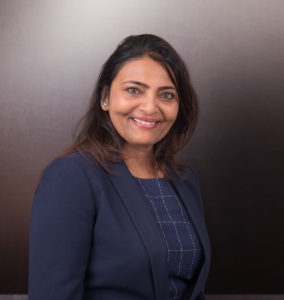“If you can’t measure it, you can’t manage it” is the principle behind Pyramid Consulting’s approach to diversity. Its Intentionally Inclusive paradigm is the umbrella for business models that help the company develop skills among diverse talent to place in varied tech fields but also enables recruiters to serve customers’ DE&I initiatives.
Pyramid Consulting co-founder and Chief Customer Officer Namita Tirath discusses how being purposeful about DE&I can help companies stand out. She emphasizes the importance of investing in the diversity cause and strategic workforce planning while partnering in the ecosystem for a more equitable world of work. C-suite sponsorship, along with education at the hiring manager and recruiter levels, has helped Pyramid Consulting ensure all process participants are on the same page. The company’s ultimate goal is to not just diversify the candidate base for its customers but make a big social impact so a better and brighter future can be created for many.
What is the Intentionally Inclusive imperative and what was the impetus behind it?
Intentionally Inclusive is a corporate initiative by which we implement and measure DE&I programs — the authenticity, as well as the value and impact of the programs internally. The impetus was to help us place qualitative and quantitative measurements around what we do in the diversity and inclusion space. As we spread the word in the marketplace that everybody needs to be intentionally inclusive and should be given equal opportunity, we wanted to be able to measure ourselves. At the same time, it’s a business imperative for our customers. So, the impetus — or business driver — is to find solutions for what our customers were looking for, which is a pipeline of diverse candidates. And here, we are looking to a greater good, a social impact.
We measure ourselves internally as a corporate initiative on several programs that I am running directly. I am responsible for creating business models that are business imperatives for my customers, and then together, we in the workforce solutions ecosystem are doing this to create a bigger, better brighter future for many.
How does Intentionally Inclusive work with the Pyramid Academy and Recruit:IN programs?
We are trying to do more under the Intentionally Inclusive umbrella. So, the two programs that we currently offer under this umbrella have a genesis in bringing diversity and inclusion to our customers. Pyramid Academy and Recruit:IN are the two business models that help diversify the candidate base for our customers.
Pyramid Academy brings in cohorts for a hire-train-deploy model based on the principles of Intentionally Inclusive. We are intentional about the cohorts we assemble for the training. We want to ensure that there’s women representation and underrepresented minorities and LGBTQ, for example. So racial diversity, sexual orientation, veteran diversity — all of that is intentional as we put together these groups.
We have graduated about 12 cohorts so far and currently have six cohorts running simultaneously. So, we are training close to about 65 to 70 people and are going to be able to find them jobs — truly create that bridge between the deserving diverse talent and actual jobs. It’s more than a boot camp, and it is all being done under the principles of the Intentionally Inclusive imperative.
On the Recruit:IN side, our business is in staff augmentation; bringing skilled labor to our customers is how we’ve become the $300 million business that we are today. So, this program of recruiting in also follows the principles of being Intentionally Inclusive. We are inclusive of talent pipelines — where earlier we might have not submitted a candidate for a certain reason. For instance, we don’t make any concessions on the skill set but we are adding the piece of diversity on top.
So, the Recruit:IN model lives under the Intentionally Inclusive umbrella for skilled labor and the Pyramid Academy model brings in diverse talent for early career reskilling/upskilling.
What makes what you are doing different from others in the marketplace?
Diversity and inclusion is catching everybody’s attention, but the conversation has been there for a long time. What differentiates Pyramid Consulting is our thinking and that we were one of the early companies in the space, not just as a diverse supplier, but in our partnerships with like-minded organizations, such as Women in Technology, HiTech and ITSMF, whose mission is to bring in African-American senior talent and Latinx high-tech talent.
Our DE&I conversations and related relationships are 20-plus years old. It’s not something that started after the social movements of last year. We know the importance of these organizations and associations and we have been able to capitalize on those relationships to truly become their partner in bringing great, diverse talent to our customers.
And we have put action behind the words, putting our own money out there, investing in our own new tools, R&D, new teams, certifications, etc., developing Pyramid Academy — whatever it took for us to create this business that is a solution to customers as they look to diversify their candidate pools.
How do we stand out? I grew up in the staffing world; it’s a very competitive industry with numerous suppliers. I am not new to competition. And everybody seems to have a DE&I model. But the principles of Intentionally Inclusive — and the businesses under that umbrella — have a far-reaching impact. By focusing on our customers and what their needs are, making sure the service that we are providing is impeccable and that we are partnering with them closely, I have seen the relationship with my customers go much deeper.
So, we differentiate ourselves by understanding the customer’s workforce needs. By conducting and doing strategic workplace planning for them. In addition, we bring in the talent they need. There is a heart behind this project; it is not just driven by the bottom line. We have to come together for a bigger social impact — finding that financial equality for individuals (from underrepresented groups). We at Pyramid Consulting are trying to create an ecosystem where we can partner with organizations that do similar work and not see each other as competition. It’s about getting these individuals the opportunity to work.
We’re looking at ways we can impact not just 60, 70 or 100 people, but 5,000 or more people. What do we do together so that there is a bigger social impact for these programs? So, partnering and bringing the ecosystem together is what is truly differentiating us from some of the competition.
What are your goals for the Intentionally Inclusive initiative?
One of our primary goals is to continue bringing in new models of workforce management under the umbrella. Besides Recruit:IN and the Pyramid Academy, we are working on a couple of other models that impact our workforce diversity projects. My intention is to continue to enhance our current offerings, but also keep working on some of the newer ways of engaging the customer and the talent. I feel that Intentionally Inclusive is a continuum of Pyramid Consulting. I see it as a wraparound — that whatever we do, we are intentional about it.
What have been your biggest challenges with implementing the Intentionally Inclusive model and message?
The biggest challenge that we face is the education that needs to be done within the corporations. While the C-suite might be in synch with the message, the challenge is getting recognition for those (diversity) commitments at the lower levels, getting the hiring managers to understand why this is being done, what the incentive behind being intentionally inclusive in their hiring practices is.
These managers need to think differently about the talent pipeline that we are able to bring to them. They need to be able to look at these talent pipelines objectively and to truly make that commitment. They should not see it as another staff augmentation model, but as a model that can increase their diversity numbers.
The models are new, the operations are new. Everybody’s still in the discovery phase. So, there is education that needs to happen at a number of fronts: at the customers’, at the talent’s at the staffing suppliers’ and at the MSPs’.
We are still learning. We’re still learning and implementing (the Inclusive Imperative principal) and changing the tires as we are driving diversity. It will mature over the next few years, but this is a great time to make an impact. My principle is: Let’s get in early. Let’s be the market movers. Let us be recognized as a DE&I influencer and do whatever the environment needs. It’s early today, but we are bringing models to the market that we may have to enhance and change as things evolve.
How has the development of the Intentionally Inclusive directives affected Pyramid Consulting’s overall DE&I initiatives?
I will say it has impacted tremendously because now we have a measurement around it under the umbrella of Intentionally Inclusive. It has really helped us quantify and qualify our internal goals on diversity and inclusion. And the measurement has really helped us look at what is wrong with what we are doing. Assessment is step one, and internal assessments help us understand where the biases are, where we are missing the mark. I’m in the process of bringing in a new role reporting to me, which is the practice head for diversity and inclusion for the company. This person will lead the Intentionally Inclusive principle and ensure that we are on the right path.
Describe the benefits that this initiative has brought to the workforce solutions ecosystem and Pyramid Consulting.
Bringing the principles of Intentionally Inclusive to the marketplace shows our customers that we are serious about this. We are impacting our customers via the business models that we are bringing to them. To say that there are just no diverse candidates available is no longer the conversation. It’s Commander’s Intent. We have to go find those people that reside somewhere.
Creating business models with SLAs on diversity and inclusion is making us intentional. It is making us intentional in seeking the right candidates for our customers who happen to be diverse.
So, we are going to diversity-rich talent pipelines that otherwise we may not have been looking at because staff augmentation is a high-speed game. Whereas here we are being intentional about the quality and the diversity of the candidates that we’re bringing to the table.
With this focus, we have been able to increase our female representation of submissions by 20% to 30%. We are submitting a lot more females in the technology space, which is an underrepresented or minority segment within IT. We have increased our Latinx and Black submissions by about 30% where we have been intentional about the submission data.
We have worked very closely with our HR teams and systems, utilizing new tools to be able to have better reporting on the EEOC data. While the candidate is still the one to report or not report on race and other related questions, we are trying through programming to make that reporting easier.
For information on how Pyramid Consulting can help your organization become more intentionally inclusive, contact our team at Marketing@PyramidCI.com









